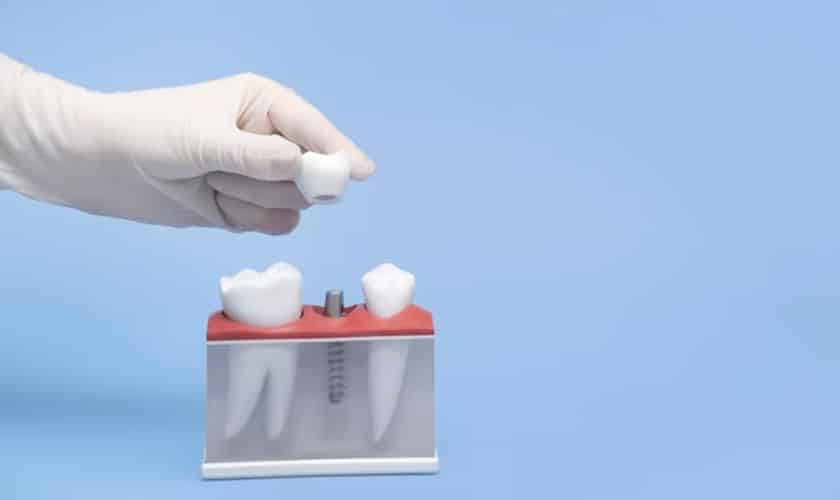Published on August 19, 2023

Maintaining dental implants is crucial for their longevity and your oral well-being. To safeguard these valuable replacements, a strategic oral hygiene routine is essential. This introduction delves into the significance of proper implant care and highlights must-have oral hygiene products that play a pivotal role in preserving the health and aesthetics of dental implants. From specialized brushes to antimicrobial rinses, understanding the arsenal of products ensures you’re equipped to maintain optimal hygiene, protect your investment, and relish the benefits of confident smiles and functional teeth for years to come.
The Unique Needs of Dental Implants
A. Understanding the differences between natural teeth and implants:
– Implants lack nerves and blood vessels, reducing sensitivity and immune response.
– Unlike natural teeth, implants are not susceptible to decay, but peri-implantitis can affect surrounding tissues.
B. Emphasizing the importance of tailored care to ensure implant longevity:
– Customized care routines are essential due to implants’ unique characteristics.
– Regular maintenance prevents complications like peri-implantitis and maintains bone health for lasting implant success.
Must-Have Oral Hygiene Products for Dental Implants
A. Soft-Bristle Toothbrush:
- Gentle cleaning without damaging implant surfaces.
– Soft bristles prevent abrasion and protect implant restorations.
– Avoiding harsh brushing maintains the integrity of the crown or bridge.
2. Reaching difficult areas around the implant and gumline:
– Soft bristles maneuver effectively around implant posts and abutments.
– Proper cleaning along the gumline reduces plaque buildup and potential complications.
B. Interdental Brushes or Floss Threaders:
1. Cleaning between implants and adjacent teeth effectively:
– Interdental brushes or floss threaders access tight spaces around implants and neighboring teeth.
– Thorough cleaning prevents food particles and plaque accumulation.
2. Preventing plaque buildup and potential gum issues:
– Proper interdental cleaning minimizes the risk of peri-implantitis and gum inflammation.
– Removing debris supports gum health and overall implant maintenance.
C. Antibacterial Mouthwash:
1. Reducing bacteria and maintaining a clean oral environment:
– Antibacterial mouthwash targets harmful microbes, promoting oral hygiene around implants.
– Rinsing helps control bacterial populations and maintains overall mouth cleanliness.
2. Minimizing the risk of infections around implant sites:
– Antiseptic properties of mouthwash discourage infection-causing bacteria.
– Consistent use supports healthy implant integration and reduces infection risks.
D. Non-Abrasive Toothpaste.
1. Preserving the integrity of implant surfaces:
– Non-abrasive toothpaste prevents wear and damage to implant crowns or abutments.
– Gentle cleaning maintains the implant’s appearance and functionality.
2. Preventing scratching or damage to the implant restoration:
– Harsh toothpaste can cause micro-scratches on implant surfaces.
– Using non-abrasive options safeguards against unnecessary wear and potential complications.
E. Water Flosser:
1. Efficiently cleaning hard-to-reach areas around implants:
– Water flossers use targeted streams of water to dislodge debris and plaque.
– Effective cleaning around implant posts and tight spaces promotes thorough hygiene.
2. Offering an alternative to traditional flossing:
– Water flossers provide a gentle and effective option for individuals with dexterity issues.
– They complement traditional flossing, ensuring comprehensive cleaning for implant maintenance.
Techniques for Effective Implant Care
Proper techniques play a vital role in ensuring the longevity and health of dental implants.
1. Gentle Brushing and Flossing:
– Use a soft-bristle toothbrush and gentle motions to clean implant surfaces and neighboring teeth.
– Employ interdental brushes or floss threaders to clean between implants and adjacent teeth.
2. Consistent and Thorough Cleaning:
– Maintain a regular oral hygiene routine, brushing at least twice a day and flossing daily.
– Pay special attention to the gumline and areas around the implants to prevent plaque buildup.
Consulting Your Dentist
Regular consultations with your dentist are essential for effective dental implant maintenance.
1. Professional Guidance:
– Dentists can provide personalized advice on proper implant care techniques and suitable oral hygiene products.
– Regular check-ups allow early detection of potential issues and prompt intervention.
2. Tailored Recommendations:
– Dentists can assess the condition of your implants and recommend adjustments to your oral care routine.
– Professional cleanings and examinations ensure the long-term success and health of your dental implants.
Source : Dr. Brett Langston
Incorporating the right oral hygiene products into your routine is instrumental in safeguarding the health and longevity of dental implants. Soft-bristle toothbrushes, interdental brushes, non-abrasive toothpaste, antibacterial mouthwash, and water flossers collectively form a powerful arsenal. Regular consultations with your dentist ensure tailored guidance, enabling you to enjoy the benefits of resilient, functional, and aesthetically pleasing dental implants for years to come.
Some FAQs include:
Here are five frequently asked questions (FAQs) about maintaining dental implants with proper oral hygiene products:
1. Do I need to use special oral hygiene products for dental implants?
Dental implants require specific care. Using soft-bristle toothbrushes, interdental brushes, non-abrasive toothpaste, and antimicrobial mouthwash helps maintain their health.
2. Can I use regular toothpaste and floss on dental implants?
While regular toothpaste and floss are generally safe, it’s recommended to use non-abrasive toothpaste and consider interdental brushes or floss threaders for thorough cleaning.
3. Are water flossers effective for cleaning around dental implants?
Yes, water flossers can be effective in cleaning hard-to-reach areas around implants. They complement traditional flossing and are useful for implant maintenance.
4. How often should I visit the dentist for dental implant check-ups?
Regular dental visits every six months are advisable for professional cleanings and examinations. Dentists monitor your implants’ condition and provide necessary guidance.
5. Can improper oral hygiene damage my dental implants?
Yes, inadequate oral hygiene can lead to complications like peri-implantitis or gum inflammation, potentially affecting the longevity and health of your dental implants.
